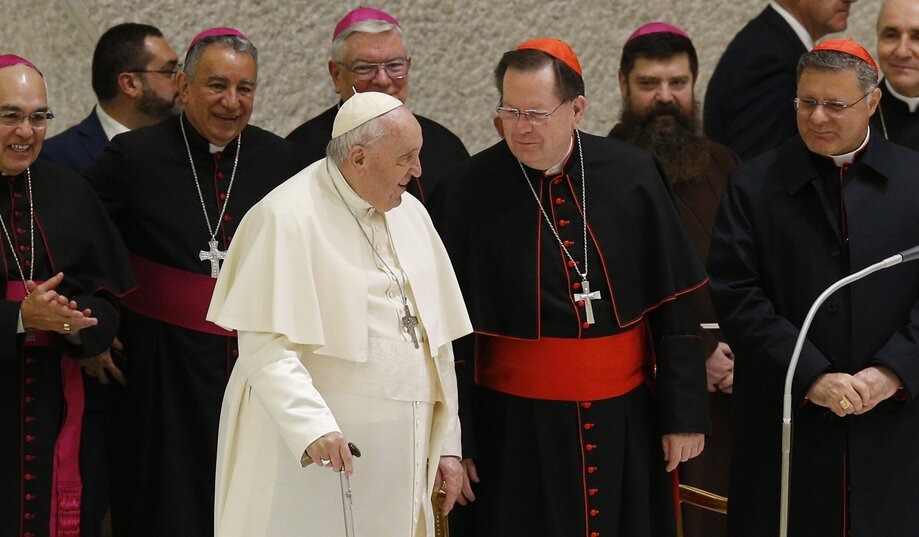Pope Francis was today in the Paul VI Hall with faithful from all over the world who attended the general audience, many of them also said goodbye to the Pope Emeritus. Benedict XVI.
The Holy Father began the audience by mentioning Benedict XVIwhose "acute and educated thought was not self-referential, but ecclesial, because he always wanted to accompany us to the encounter with Jesus. Jesus, the Risen Crucified One, the Living One and the Lord, was the goal to which Pope Benedict led us, taking us by the hand".
Making yourself known
With his preaching at today's audience, the Pope concludes the catechesis on discernmentwhich has been going on since August. To close this cycle, Francis referred to "spiritual accompaniment, important first of all for self-knowledge, which we have seen is an indispensable condition for discernment".
In spiritual accompaniment, the Pope said, "it is important, first of all, to make ourselves known, without being afraid to share our most fragile aspects, in which we discover ourselves to be more sensitive, weak or fearful of being judged. Fragility is, in fact, our true richness, which we must learn to respect and welcome, because, offered to God, it makes us capable of tenderness, mercy and love. It makes us human. This fragility is not so much something negative as part of the beauty of human nature, because "God, in order to make us like himself, wanted to share to the very end our fragility".
Spiritual accompaniment and discernment
Spiritual accompaniment is a necessary tool for discernment, because "if it is docile to the Holy Spirit, it helps to unmask even serious misunderstandings in our consideration of ourselves and in our relationship with the Lord". Through a spiritual accompaniment that resembles the confidences of the Gospel characters with Christ, God can be found. There are examples of this in the Gospel accounts that recall that "people who have a true encounter with Jesus are not afraid to open their hearts to him, to present to him their vulnerability and inadequacy. In this way, their sharing becomes an experience of salvation, of forgiveness freely received".
The Holy Father assures us that "telling someone else what we have experienced or what we are looking for helps, first of all, to bring clarity to our interior, bringing to light the many thoughts that inhabit us and that often disturb us with their insistent refrains". Through accompaniment, "we discover with surprise different ways of seeing things, signs of goodness that have always been present in us".
However, it is important to remember that "the one who accompanies does not replace the Lord, does not do the work in place of the one being accompanied, but walks at his side, encourages him to read what is moving in his heart, the place par excellence where the Lord speaks".
The basics of accompaniment spiritual
The Pope did not want to forget the pillars on which spiritual accompaniment is based. Thus, he says that "accompaniment can be fruitful if, on both sides, we have experienced the filiation and the spiritual fraternity. We discover that we are children of God when we discover that we are brothers and sisters, children of the same Father. This is why it is indispensable to be part of an itinerant community. We do not go to the Lord alone. As in the Gospel story of the paralytic, we are often sustained and healed thanks to the faith of another person". When these foundations are not firm, "accompaniment can give rise to unrealistic expectations, misunderstandings and forms of dependence that leave the person in an infantile state".
Maria, teacher
It is not only in Jesus that one finds a teacher who teaches how to live accompaniment, the Pope highlights the figure of St. Mary'sShe is a "teacher of discernment: she speaks little, listens much and guards her heart. When she speaks, Francis said in the audience, she does so with wisdom. "In the Gospel of John, there is a very brief phrase pronounced by Mary that is a watchword for Christians of all times:"Do what He tells you" (cf. 2:5)".
This wisdom of the Virgin is born because "Mary knows that the Lord speaks to the heart of each one of us, and asks us to translate this word into actions and choices". She knew how to incarnate all this in her life, in such a way that "she is present at the fundamental moments of Jesus' life, especially at the supreme hour of his death on the cross".
Discernment, art and gift
The Pope concluded this last catechesis on discernment by affirming that discernment "is an art, an art that can be learned and that has its own rules. If it is learned well, it allows us to live our spiritual experience in an ever more beautiful and ordered way. Above all, discernment is a gift from God, which must always be asked for, without ever presuming to be an expert and self-sufficient".
It is important to keep in mind that "the voice of the Lord is always recognizable, it has a unique style, it is a voice that soothes, encourages and reassures in difficulties". This voice is the one that throughout the Bible repeats "Do not be afraid". Knowing this, "if we trust in his word, we will play the game of life well, and we will be able to help others. As the PsalmHis Word is a lamp to our feet and a light to our path (cf. 119.105).







